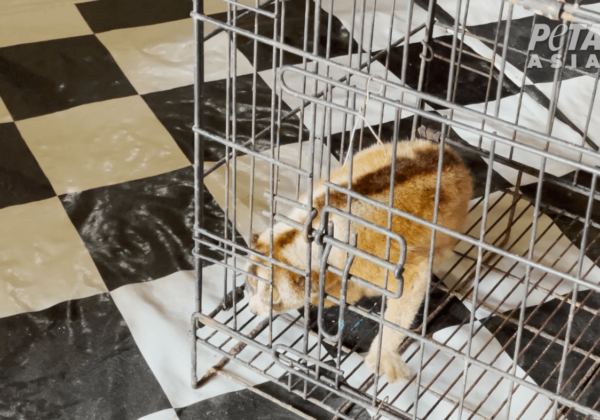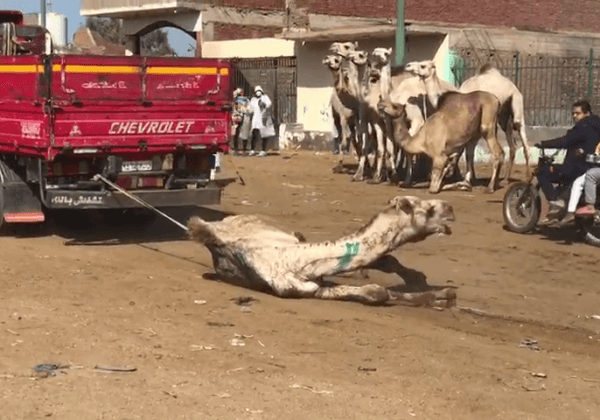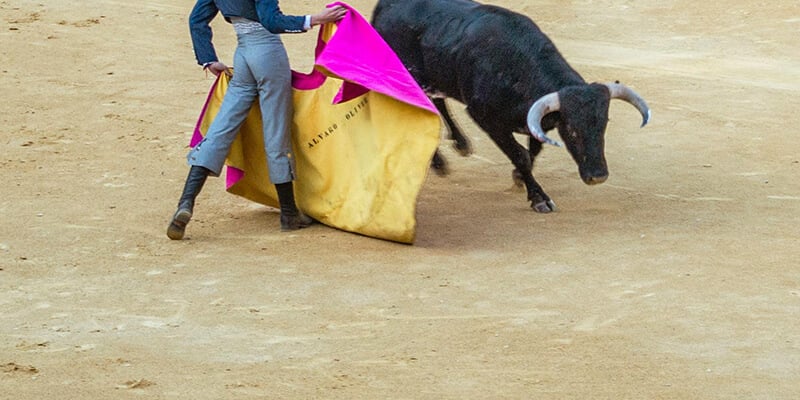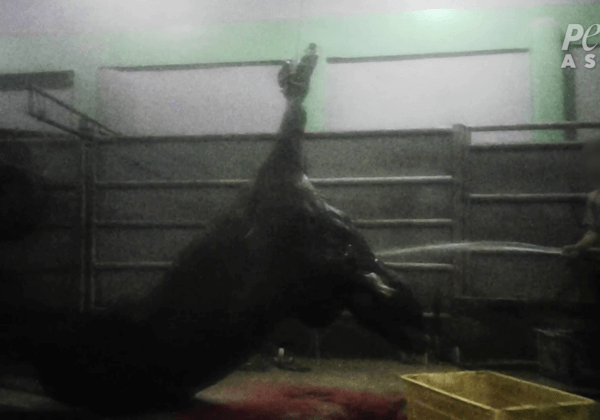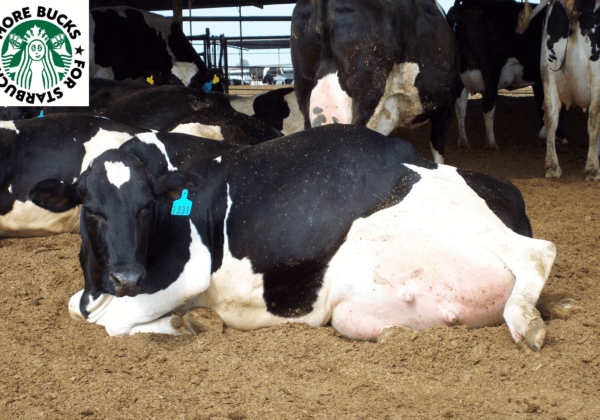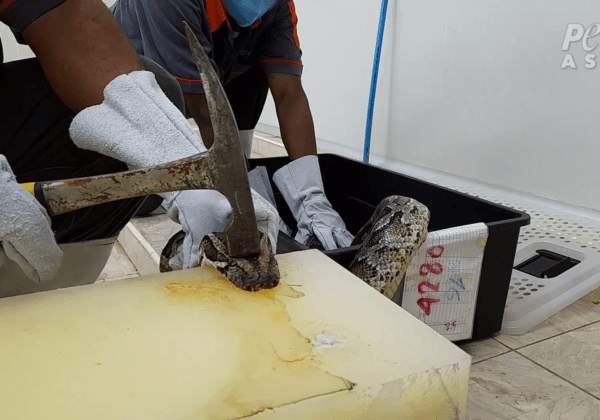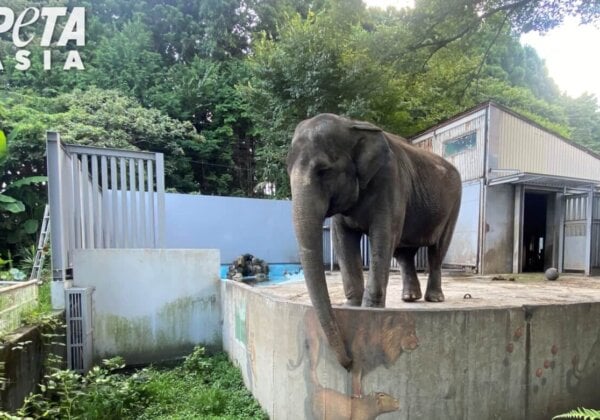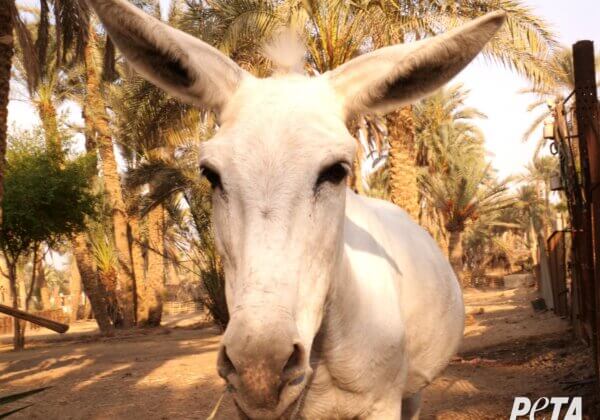Heartbreaking: The Circus Industry in China
Throughout China, circuses, traveling shows, and roadside displays force animals—including bears, monkeys, tigers, lions, dogs, and others—to perform for the public. A PETA Asia investigator visited 10 different circuses and animal training facilities in the city of Suzhou, which alone encompasses more than 300 circuses, and documented animal abuse and suffering on a massive scale.
PETA Asia’s investigator documented that bear cubs, including the animals shown below, are chained or tethered to a wall and forced to remain upright, sometimes for hours, in order to train them to walk on their hind legs. If they can’t hold themselves up, they risk choking and hanging themselves.
Forcing bears to stand for prolonged periods of time on their hind legs can cause lifelong physical problems. Jin Yipeng, deputy professor of veterinary medicine at China Agricultural University, notes, “Over the long term that causes permanent joint damage or even necrosis and paralysis. … [T]he animals often acquire these problems in their youth, meaning they suffer for the rest of their lives.”
Some bear cubs like these were also tethered to a hook in the ground by a short rope, making it impossible to move more than a few inches in any direction.
Bears were also forced—through violence and intimidation—to jump over objects, walk on their hands, and perform other confusing tricks. As seen in the video, the cubs cried, screamed, grunted, and groaned during training. They repeatedly resisted, but trainers yanked on their neck ropes, dragged them, grabbed them by the fur on their backs, yelled at them, and forced them to continue.
This bear, named Doudou by the investigator, was pulled by the rope around her neck and forced to walk on parallel bars. If she stopped or made a mistake, she was hit with a stick.

When they weren’t being forced to perform, the bears were confined to cramped, barren cages. They cried out, pawing and biting at the bars, desperate to escape.


This caged bear’s snout was pierced by a metal ring, which was used to lead her around. Such procedures are frequently performed without any pain medication.

Lions and tigers were forced to balance on balls, roll around on the ground, and stand on their hind legs. Trainers hit, jabbed, and threatened them with long, heavy metal poles, some of which had whips on the ends.

When not being forced to perform, big cats were confined to barren cages with little space to move around in. Only one of the 10 facilities toured by the investigator had an indoor area in which tigers could find relief from the sweltering heat.
The investigator found monkeys grimacing, struggling against neck chains, defecating in fear, and attempting to escape from their handlers. One monkey was chained to a goat’s horns and forced to do a handstand while the goat climbed a ladder and stood on a vase balanced on a high beam. As he struggled to keep his balance, a handler repeatedly jabbed him with a metal pole.
This monkey, named Xiaohau by the investigator, was dragged and yanked around by a rope around her neck, causing her to struggle and try to escape from her trainer.

Monkeys were kept in and chained to small, barren cages, in which they thrashed around and paced back and forth, showing signs of intense distress. They had no choice but to eat, drink, sleep, defecate, and urinate all in one small area.
Other animals, such as dogs, llamas, and pigs, were also kept in decrepit conditions and forced to perform.
This senior dog, named Laifu by the investigator and too old to perform, was forced to live in this cage 24 hours day and never let out.

Help Stop Circus Industry Cruelty
This abuse is not unique to China. Any circus that that uses animals inevitably subjects them to terrifying and cruel training methods as well as barren, cramped living conditions.
More people are becoming aware of the cruelty involved in forcing animals to perform, but it’s time for all of us to stop patronizing animal circuses. Bolivia, Colombia, Ecuador, Greece, Mexico, Singapore, and many other countries around the world have banned or are in the process of banning wild-animal acts.
Please never patronize any animal “attraction.” Every ticket purchased supports a cruel industry. Take your friends and family to see only animal-free circuses.
Share this investigation with your friends and family.
Share on Facebook Share on Twitter

